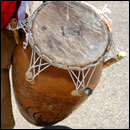 |
||
|
|
 |
|||||||

|
How did your life collide with the headlines in 2007? What's your holiday performance story? |
| One Thing: Somalia to Portland November 10, 2007 |
Abdiasis Mohamed: My name is Abdiasis Mohamed , I am one of the Somali Bantu community.
Women: Morning! Morning to you! Morning!
Abdiasis Mohamed: What we gonna show you today is mainly what is the Somali Bantu culture and what it's based on. We usually sing together and come up with songs. Most of the Bantu songs, they come under situations. These kind of situations were like, when the civil war started in Somali, from 1991-92, when the civil war broke out in Somali. That's when the song started.
Omar Abdirahaman: In 1992, the war break down in the Somali country. That war affected all the country, but especially, our community -- Somali Bantu. In Somalia, there is a group called Somalia who are holding the power, and there is other small-small group like me. I am Somali Bantu. We are just people who are farming, people they go to farm in the morning and they come home in the evening. Just do some guitar, some song, drumming, play music.
Abdiasis Mohamed: The Bantus are the major farmer that grow all the stuff for the government. So the government will come use force - take whatever you grow by force and you can't say anything.
Omar Abdirahaman: Our people the Somali Bantu was discriminated. So that's why when the war break down, we doesn't have any minister, any political person. So the whole system of our community was break down. My father was killed in front of me. Someone come to our home with a gun and shoot our dad. The next morning one of my neighbors, he was shot and killed. We walked 12 days. I didn't bring anything because I couldn't carry anything. Everything I have, I just left it.
Abdiasis Mohamed: These kind of songs are mainly based on the running away from home to the refugee camps. So you're just running from Somali to Kenya for refugee. you're running away. you're escaping for your life. It's kind of running and singing. You don't know where to go. That's how the song came over.
Omar Abdirahaman: We spent there almost 15 years in the refugee camp. Even in Kenya, there is no full peace. In the refugee camp, in Kenya even, one day what happened is, my wife goes some places to look for food. There is people who have a gun, they are walking around in the evening. One day my wife go out from the refugee camp, she has been raped and then beaten. The left side was broken and up to now, she's not feeling well, that left side. In the refugee camp, we have a big board, with the name of the refugee families printed out. And every single week, they put on the board the names of the refugee and then what's the plan. So I saw my name and all my family. It said that Abdirahaman, your case has been approved by the United States and you will be resettled in the United States. That is the day I start breathing even.
Abdiasis Mohamed: Actually we have a wedding party for two community members from our Somali Bantu Community. They're gonna celebrate. Eat food, dance. Music, drum, and everything. We are here now, people go to school. Kiddies go to school.
Girls: I'm from Somalia. I'm from Somalia, too. We're the same. We're sisters. We have, like same grandma and grandpa.
Abdiasis Mohamed: It's kind of a dream come true. And we've been waiting for a long here.
Omar Abdirahaman: Now I am in the United States and my life already changed, my kiddies changes, I get a job and the kiddies go to school, they already speaking English. But I don't want them to forget the American culture or our culture too, so when I have the time, I just volunteer myself to call some of the kiddies to show them how to play guitar and our cultural dances and then drums. We are still thinking people that we left behind in the Africa refugee camp. The people are still there.
Woman: My name is Gedi Abdi. Mainly, I am alone here, my kiddies -- one is in Nairobi and one is Somalia back home, and there's no chances for me to bring them over here.
Abdiasis Mohamed: We sing this song for the struggle of freedom. May God give us our freedom. So we not going to leave any kiddies behind, ladies men women, youth, elderly people even. We're not going to leave anyone behind until we all die or get our we get our freedom back. Anywhere you go, show that this is our culture and it can be known so that we are people that are known that we are here.






